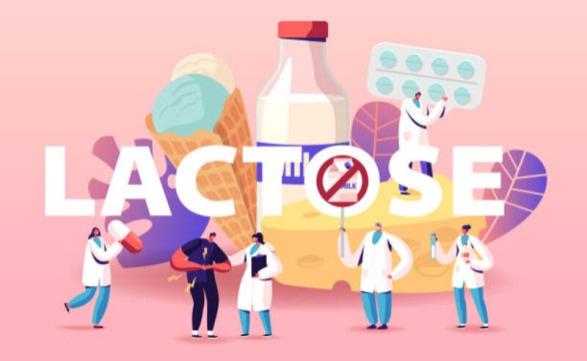12 Tell-Tale Signs You Might be Suffering from Lactose Intolerance
Nov 07, 2023 By Nancy Miller
If you’ve ever had a glass of milk and within minutes felt bloated, gassy or nauseous, you may have an issue with lactose intolerance. While many people are familiar with the symptoms that follow after consuming dairy products, they might not be aware of other signs that can indicate this condition. That's why it’s important to recognize potential signals early on by looking out for subtle changes in how your body responds to eating foods containing dairy such as cheese, ice cream or yogurt. From stomach aches and gas to skin problems and fatigue, here are 12 tell-tale signs that could point towards lactose intolerance – allowing you to take steps toward finding solutions if needed!
Overview of lactose intolerance

Lactose intolerance is a digestive condition in which the body has difficulty digesting lactose – a sugar found in milk and dairy products. This occurs when there isn’t enough of an enzyme called lactase produced in the small intestine, leading to undigested lactose reaching the colon. The bacteria then break down the lactose producing gas and other byproducts that cause the unpleasant symptoms.
1. Feeling gassy or bloated
One of the most common signs of lactose intolerance is feeling gassy or bloated after consuming dairy products. This usually occurs because your body lacks the enzyme needed to break down lactose, a sugar found in milk and other dairy products.
2. Stomach pain and cramping
Stomach pain and cramping are also common symptoms of lactose intolerance. When your body fails to properly digest lactose, it can cause discomfort in the stomach area.
3. Diarrhea
Diarrhea is a sign that your body is having trouble breaking down and absorbing lactose. This can be especially problematic for those with severe lactose intolerance as it can lead to dehydration and other health issues.
4. Nausea
Nausea is another common sign of lactose intolerance. It is a result of your body struggling to digest lactose properly, causing discomfort and feelings of sickness.
5. Vomiting
In more severe cases, vomiting can occur as a reaction to consuming dairy products for those with lactose intolerance. This is a more serious symptom that should not be ignored.
6. Headaches
Many people with lactose intolerance may also experience headaches after consuming dairy products. This can occur due to inflammation and other reactions caused by the body's inability to digest lactose properly.
7. Skin problems
Some studies have shown a link between lactose intolerance and skin conditions such as eczema and acne. This is likely due to the inflammation caused by lactose intolerance, leading to skin flare-ups.
8. Fatigue
Fatigue can be a result of various factors including poor digestion. People with lactose intolerance might experience fatigue after consuming dairy products because their bodies are working harder to break down lactose.
9. Difficulty concentrating
Cognitive function can also be impacted by lactose intolerance. Difficulty concentrating or brain fog may occur as a result of inflammation and other reactions caused by the condition.
10. Difficulty breathing
In rare cases, lactose intolerance can cause difficulty breathing, especially for those with severe allergies to dairy. If you experience this symptom after consuming dairy products, seek medical attention immediately.
11. Weight loss
Some people with lactose intolerance may experience weight loss due to chronic diarrhea and a decrease in nutrient absorption. This can be concerning and should be addressed by a medical professional.
12. Family history of lactose intolerance
If other members of your family have been diagnosed with lactose intolerance, there is a higher chance that you may also have this condition. It is important to be aware of your family history and look out for any symptoms that could indicate lactose intolerance.
As you can see, there are a variety of signs that could point towards lactose intolerance. If you experience any of these symptoms after consuming dairy products, it's best to consult with a doctor for proper diagnosis and treatment options.
Managing Lactose Intolerance

If you are diagnosed with lactose intolerance, there are steps you can take to manage the condition and still enjoy dairy products in moderation. This may include taking lactase enzyme supplements, opting for lactose-free dairy products, or finding alternative sources of calcium and vitamin D.
In addition, keeping a food diary can help you identify which foods trigger your symptoms and make necessary dietary changes. It's also important to read food labels carefully and be aware of hidden sources of lactose in processed foods.
Overall, by being aware of the signs and symptoms of lactose intolerance and taking proactive steps towards managing it, you can still maintain a healthy and enjoyable diet without compromising your digestive health. So if you suspect you may have this condition, don't hesitate to seek medical advice and make necessary changes to your diet. Your body will thank you for it! So remember, always listen to your body and take care of your health. And if dairy doesn't agree with you, there are plenty of other delicious and nutritious food options out there waiting for you to try! Keep exploring and stay healthy.
Lactose replacement and supplements
For those with severe lactose intolerance, completely eliminating dairy products from the diet may not be necessary. Instead, there are lactose replacement products and supplements available that can help digest lactose more effectively.
These include lactase enzyme drops or pills that can be taken before consuming dairy products to aid in digestion. There are also various plant-based milk alternatives such as almond, soy, or coconut milk that are naturally lactose-free.
Conclusion
Lactose intolerance is a common condition that affects many people around the world. It can cause discomfort and other health issues, but with proper management and understanding of your body's needs, you can still enjoy a balanced and healthy diet.
If you suspect you may have lactose intolerance, consult with a healthcare professional for proper diagnosis and advice on managing the condition. With a little effort and awareness, you can still savor the taste of dairy products without any negative effects on your health. So don't let lactose intolerance stop you from enjoying all the delicious food options available to you. Take care of yourself and always listen to your body's signals.







